Some Candy Talking: Five Albums by The Jesus and Mary Chain
reviewed by j.d. lafrance
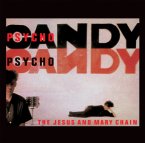
Scottish rock 'n' rollers the Jesus and Mary Chain have always been judged by their sound, oscillating between feedback or without, but rarely have they been appreciated for their true strength: writing perfect pop songs. The band has always prided themselves on their songwriting, and how they use this ability to write that always elusive classic pop song. For William and Jim Reid, the driving force behind the Mary Chain, this pursuit is what kept them going, what kept them making records. The good folks at Rhino records have re-released five Mary Chain albums – Psychocandy, Darklands, Automatic, Honey's Dead and Stoned and Dethroned – complete with liner notes and videos that went with that particular LP.
Since they blazed onto the British music scene in 1985, they released nine albums with Munki being their swan song in 1998. In their own quiet, unassuming way, the Mary Chain brought three-chord feedback back into style. They were considered to be veteran rockers in Europe, but here, despite appearing on the 1992 Lollapalooza tour and David Letterman twice, only cracked the mainstream with the single “Sometimes Always” off the Stoned and Dethroned album. This is rather odd when you realize how catchy and American-sounding their songs are. With numerous comparisons that range from the Beach Boys to the Velvet Underground, you would think that they would have sold out stadiums here, but the Mary Chain remained something of a musical oddity.
William and Jim Reid grew up in the industrial Scottish town of East Kilbraid playing in a number of local groups. It was during this time that they met drummer Bobby Gillespie and bassist Douglas Hart and formed the Jesus and Mary Chain in the summer of 1984. The impetus to form the band stemmed from the conditions of the UK music scene which had become stagnant and complacent. The band began to court controversy and outrage at every step in an effort to shake things up. This included brief gigs that sometimes erupted in riots when disappointed fans wanted more and ended up trashing the venue. The aim of the band was to make disrespectful, dangerous music and to this end, they wanted to provoke a reaction from their audience.
By 1985, the Mary Chain signed with up and coming independent label, Blanco Y Negro and released three classic singles in succession: "Never Understand," "You Trip Me Up," and "Just Like Honey." Many of the songs could be best categorized as tumultuous pop gems with painful levels of feedback reminiscent of a jet engine. “You Trip Me Up,” for example, features a booming drum beat with a catchy pop melody buried under layers of noise. The crowning touch were the vocals, barely intelligible with all of this chaos going on that must have sounded like a breath of fresh air at a time when perfect sounding bands like Duran Duran and Spandau Ballet were running amok.
Their debut album, Psychocandy was released that year and was immediately praised as an instant-classic by the British press. Even mainstream North American magazines like Rolling Stone sat up and took notice with the Los Angeles Times considering it to be one of the "best British rock albums of the year." In short, the album was everything a rock 'n' roll record should be: short, loud, dangerous, and guaranteed to send your parents screaming for the ear plugs.
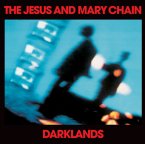
The Jesus and Mary Chain shifted gears with their next release, Darklands in 1987. They downplayed the feedback, and instead opted for a more atmospheric approach. This album also showcased many of the band's influences - the most obvious being the Velvet Underground, which the band has tried to downplay, but their effect is undeniable. The use of simple drum beats, guitar chords with feedback, and songs obsessed with drugs, cars, and American popular culture are all staples of the VU that the Mary Chain appropriated in their own music. Their look was even VU-inspired: black clothing consisting of leather jackets, jeans, and sunglasses. The Mary Chain not only had to sound dangerous, but looked the part as well, hence the leather-clad attire of the Psychocandy and Darklands years.
The Reid brothers looked to people like Bob Dylan (circa 1964-66) and Bo Diddley for inspiration in the songwriting area. Their intention was to write songs that sent you to another world, to create not only beautiful pop songs, but soundscapes as well. Psychocandy and in particular, Darklands is the epitome of this approach. With its almost country-like guitar riffs and dreamy, brooding vocals, Darklands is the perfect late night listening music with songs like “Happy When It Rains”, “April Skies” and “On the Wall” evoking countless images of dark, rainy days and nights.
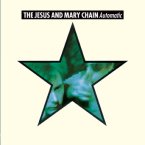
The always fickle British press was not too pleased when the Reid brothers released Automatic in 1989. Abandoning the feedback-soaked atmosphere of Psychocandy for a drum machine and a surf band sound as typified on tracks like the catchy “Coast to Coast” and “Between Planets.” The Mary Chain once again defied the British press who wanted the band to repeat themselves over and over, but as always, the Reid brothers picked their own path. This album is perhaps their most pop culture-influenced record to date with references to Pepsi, fast cars, and samples from the film Midnight Cowboy (1973). However, the album was not as strong as their previous efforts and was in danger of fading into obscurity. Along came those rock 'n' roll upstarts, the Pixies who covered "Head On" on their Trompe Le Monde (1992) album. This resulted in a surprise hit, revitalizing the album.
That new direction was explored on Honey's Dead (1992), a clever mixture of the raw sounds of Psychocandy and the catchy melodies of Automatic. It was also a return of sorts, to the Mary Chain's dangerous roots. The first single, "Reverence," was banned from play on Top of the Pops after the producer decided that the lyrics were "unsuitable for an early evening show." Lyrics like, "I wanna die just like Jesus Christ / I wanna die on a bed of spikes," didn't exactly conform to mainstream consumption. The video for "Teenage Lust," which featured footage of an underage girl stripping, was in turn universally banned by most music video shows, but made regular appearances in the band's live show.
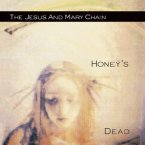
The new album also marked the Mary Chain's attempt to conquer North America. To this end, they joined the Lollapalooza tour in 1992 along side powerhouse bands like Pearl Jam, Soundgarden, Ministry, and the Red Hot Chili Peppers. For them, the whole experience turned out to be a big disappointment. The band clearly felt estranged from the rest of the groups and pretty much kept to themselves. It also didn't help that the Mary Chain aren't particularly fond of touring as they had a tendency to get burnt-out very easily. The whole experience left the band very drained and the brothers took some time off.
Finally, the Mary Chain resurfaced with a new album in 1994 called, Stoned and Dethroned, the title itself is a joke on how they were viewed by the British press. The album originally started off as an acoustic project with many musicians appearing with the Reid brothers, but they quickly realized that not all the songs lent themselves to such rigid parameters and ended up having only two guests join them: Mazzy Star's Hope Sandoval and ex-Pogues singer, Shane McGowan.
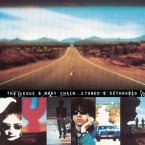
Completely stripping away the feedback and using a wide range of guitars, the Mary Chain finally brought their strength to the forefront. Stoned and Dethroned featured some of the best songs the Reid brothers had ever written. They still didn't veer from the three-chord rock structure, but instead layered instruments on top of one another to create a unique soundscape that conjured up images of the sunsets and desert landscapes found in the American southwest. It didn't hurt that these kinds of images appeared in the form of photographs in the CD booklet and were taken from the video for the first single off the album, "Sometimes Always." Stoned and Dethroned is one of those albums that improves with every subsequent listen as you begin to immerse yourself in the Mary Chain's world of lost love, broken dreams, and down-on-their-luck losers.
In a nice touch, Rhino has included, as a bonus, three videos to accompany each CD that are playable on a DVD player. For fans that have trolled eBay for a long out-of-print VHS tape that collected all of their earlier videos this is a godsend. However, the videos from Barbed Wire Kisses, their B-sides album, are still missing in action and so we are without the videos for “Some Candy Talking,” “Kill Surf City,” “Sidewalking” and “Just Out of Reach.”
Many critics had written the Jesus and Mary Chain off after Automatic, but as Stoned and Dethroned so triumphantly proved; they were a long way off from becoming rock 'n' roll dinosaurs. From their raw, inexperienced Psychocandy days, the brothers progressed with each succeeding album, maturing and honing their songwriting abilities as well as their musicianship. Even though they never reached dizzying heights of popularity, maybe it was just as well. They had never been content in the spotlight, instead taking refuge in the background where they quietly subverted mainstream music. One only has to listen to contemporary bands like the Black Rebel Motorcycle Club to see that the Jesus and Mary Chain continues to influence other bands.
Copyright (c) 2006 erasing clouds |
|